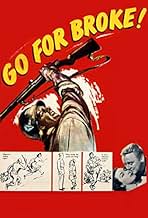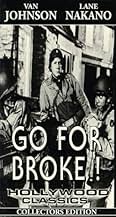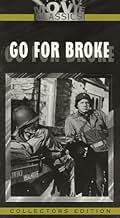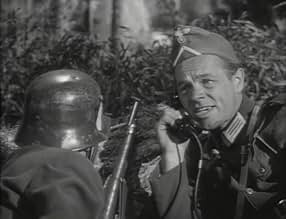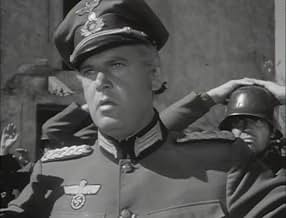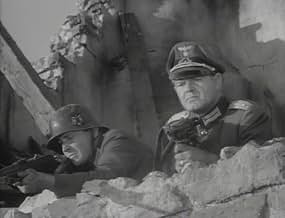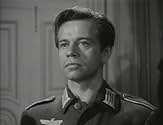The story of Japanese-American soldiers who fought in Europe during World War II.The story of Japanese-American soldiers who fought in Europe during World War II.The story of Japanese-American soldiers who fought in Europe during World War II.
- Nominated for 1 Oscar
- 1 win & 1 nomination total
- Rosina
- (as Gianna Canale)
- Soldier
- (uncredited)
- Lieutenant
- (uncredited)
- Masami's Buddy
- (uncredited)
- Mail Clerk
- (uncredited)
- German Officer
- (uncredited)
- Chaplain
- (uncredited)
- Director
- Writer
- All cast & crew
- Production, box office & more at IMDbPro
Featured reviews
The movie follows the exploits of the 442, the first all-Nisei (Japanese- American) Regimental combat team in WWII. In early 1942, all the Japanese- Americans in California, Seattle, Oregon and Hawaii were uprooted from their homes and put into camps. All the volunteers were from the 10 internment camps throughout the western states. They felt that this was the only way to prove to the U. S. that they were as patriotic as anybody else, in fact most of them were American Citizens! Since they had nothing to lose, but their lives, their motto was "GO FOR BROKE!" and that's what they did. They are today the most decorated battalion in the history of the U.S. military and proved something that they shouldn't have to be proved, that they were Americans!
Van Johnson is used as the "white man" foil, to show how the rest of the country looked at the Japanese-American, and he does a great job. He starts off as a bigot, but as he begins to understand and respect his troops, he becomes one of them. There's a funny scene where one of his men call him "BAKATARE",
which is a curse word close to "Damn, stupid...." and tells him that the soldier is being very polite, he's bowing as he says this. This film has everything: humor, action, great characters and... truth!
Van Johnson harbors prejudice as he chosen to shape these recruits up. While he runs into difficulty with top brass, he does his job well.
He comes to understand and appreciate his men. When he meets up with his old Texas regiment, he fights someone for passing an anti-Japanese remark.
The Japanese players do a good job of showing that their true spirits were with the U.S.
A totally satisfying film depicting the human spirit.
One of my grandfather's brothers was in the 442nd himself, and can still recall tales of basic training and serving in Italy.
I am bothered, however, by the fact that the cover on the video box does not show a single Japanese-American face, and the description does not really explain the historical significance of the events portrayed.
Hey Ted Turner, get your guys together and rectify this problem!
Dwight Sora
That could all be a little too rhetorical for its own good, but Pirosh never over-stresses his point, and his picture is never holier-than-thou. "You see, Sir, I'm from Texas", Grayson says to his superior, but Pirosh lets it go at that and doesn't lash out against Southern bigotry. I really liked the gentle irony of Pirosh' contrasting the idyllic, outdated guidebooks to Italy and France that Grayson reads with the prosaic reality of war-torn countries.
Did you know
- TriviaSeveral of the main characters were played by actual members of the 442nd Regimental Combat Team depicted in the film. The men saw action with the outfit in Italy and France.
- GoofsWhen Lt Grayson formally reports to his regimental commander at Camp Shelby, he performs a complete salute before the commander even begins his. Proper procedure would be for Grayson to bring his salute up, wait for his commander to complete a full salute, then return his arm to his side.
- Quotes
[first title card]
Title Card: "The proposal of the War Department to organize a combat team consisting of loyal American citizens of Japanese descent has my full approval.
[second title card]
Title Card: The principle on which this country was founded and by which it has always been governed is that Americanism is a matter of the mind and heart; Americanism is not, and never was, a matter of race or ancestry."
Title Card: Franklin D. Roosevelt
[third title card]
Title Card: The 442nd Regimental Combat Team and the 100th Infantry Battalion were composed of American citizens of Japanese ancestry.
Title Card: * * *
Title Card: BATTLE RECORD:
Title Card: 7 Major Campaigns in Europe
Title Card: 9,486 Casualties
Title Card: 18,143 Individual Decorations
Title Card: 7 Presidential Unit Citations
[fourth title card]
Title Card: This picture tells part of their heroic story. It starts at Camp Shelby, Mississippi, in 1943...
- ConnectionsEdited into WW II Theater: Go For Broke (2022)
- SoundtracksThe Meaning of Love
Written by Robert Pirosh, Alberto Colombo and Ken K. Okamoto
Details
Box office
- Budget
- $1,337,000 (estimated)
- Runtime
- 1h 32m(92 min)
- Color
- Aspect ratio
- 1.37 : 1


